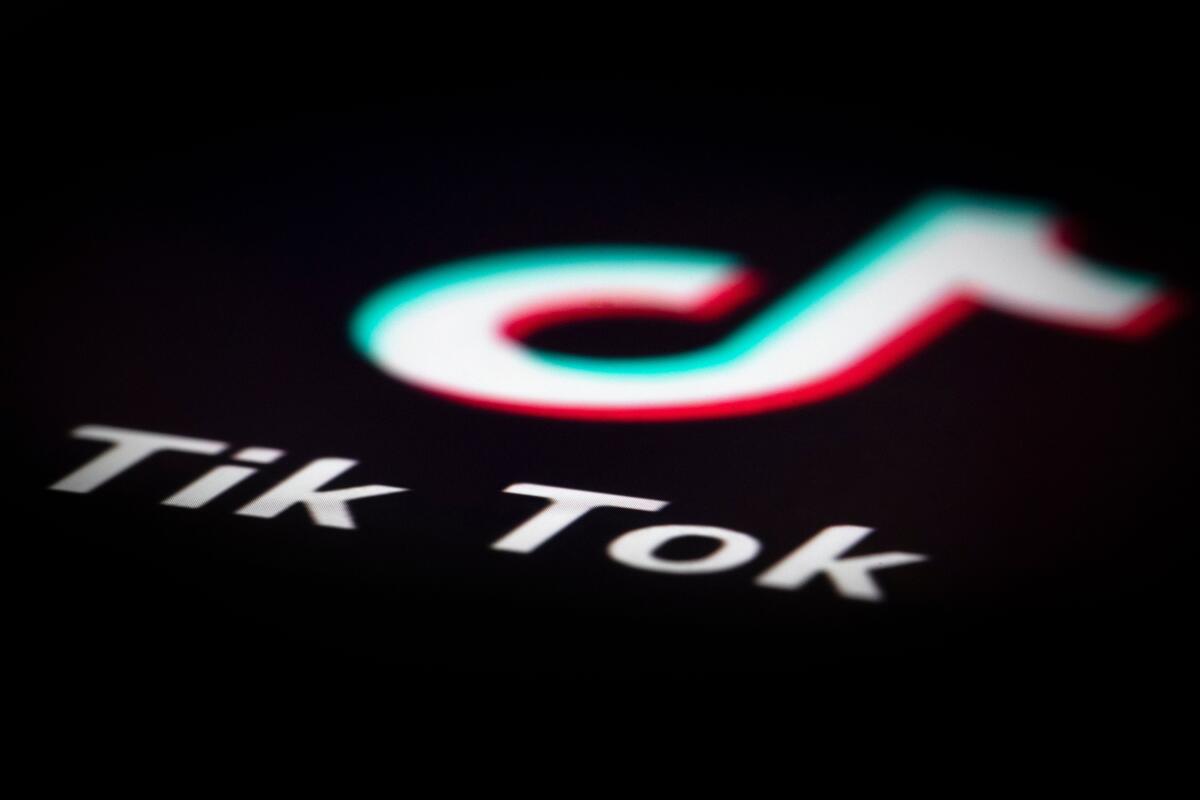Amazon email on TikTok highlights app’s security concerns and U.S.-China tech standoff

- Share via
Hours after sending an email instructing employees to remove the social media app TikTok from their phones, citing unspecified “security risks,” Amazon.com Inc. said Friday the message was sent in error.
The curious sequence of events came days after the White House amped up messaging that casts the popular Chinese-owned service as a potential threat to national security.
Secretary of State Michael R. Pompeo and President Donald Trump said early this week the federal government was weighing a ban on the app in the U.S. because of concerns surrounding Chinese surveillance.
Trump’s and Pompeo’s comments represent the latest escalation of conflict between the U.S. and China, which are locked in a global competition for technological dominance. The Trump administration has aggressively campaigned against China, launching a trade war with China more than two years ago, and clamping down on China’s premier telecommunications company, Huawei Technologies Co., by barring the company from doing business with U.S. firms. While the Huawei crackdown shook the world of enterprise tech, with TikTok, the war could touch U.S. consumers directly.
There are real security concerns about TikTok, experts say, but the Trump administration’s harsh stance on the app appears to be heavily driven by its posturing toward China. Were TikTok to end up a casualty of this war, it could have wide-reaching effects.
Amazon’s email to employees, the existence of which was first reported by the New York Times and independently confirmed by the L.A. Times, said TikTok, which lets users create and share short videos of themselves with millions of viewers, would no longer be allowed on mobile devices that access Amazon email. Employees would still be allowed to use TikTok on their Amazon laptops using a web browser, the email said. TikTok is owned by Chinese company ByteDance.
An Amazon spokesperson declined to provide more details about how the error occurred.
TikTok said in a statement that the company is committed to respecting the privacy of users: “While Amazon did not communicate to us before sending their email, and we still do not understand their concerns, we welcome a dialogue so we can address any issues they may have and enable their team to continue participating in our community. We’re proud that tens of millions of Americans turn to TikTok for entertainment, inspiration, and connection, including many of the Amazon employees and contractors who have been on the frontlines of this pandemic.”
U.S. companies such as Amazon are likely watching these developments carefully and paying close attention to cues from the government, said Wedbush analyst Dan Ives.
If Amazon had stuck with its original memo, it would have been the biggest company to warn its employees of TikTok as a possible security risk.
Earlier this week, Wells Fargo ordered employees who had installed TikTok on company mobile devices to delete the app due to privacy concerns. The Democratic National Committee had previously issued guidance in December asking employees to stop downloading the app. The Republican National Committee followed suit on Friday.
ByteDance acquired Musical.ly — the American company that has since merged with TikTok — in 2017. Last November, the U.S. government opened a national security review of that deal.
Security concerns about TikTok are legitimate: Information the app collects hypothetically could be exploited, said Justin Sherman, a fellow with the Cyber Statecraft Initiative at the Atlantic Council.
But Sherman said he doesn’t think the the Trump administration’s push is based on legitimate intelligence, and is more political posturing than anything else. Huawei, which provides critical telecommunications equipment, poses a much clearer security threat than TikTok, Sherman said.
“All these statements, policy announcements and strategies focused on Chinese technology are really about politics. They’re about posturing and looking tough in this trade war,” Sherman said.
The company has taken steps to define itself as an American entity, seeking to shift attention away from its Chinese ownership. In May, ByteDance hired Kevin Mayer, an American who spent most of his career at Walt Disney Co., as TikTok’s new CEO. The company also stopped using Chinese moderators to monitor content in other countries this year.
Unlike Trump’s battle with Huawei, which primarily affected U.S. companies selling computer hardware and internet access in rural areas, the administration’s battle with TikTok could mean depriving millions of U.S. users of an increasingly beloved service.
Tobias Rugger, a teacher in San Francisco’s public school system, uses TikTok regularly to find videos of Black Lives Matter protests and police brutality, as well as for entertainment. “It’s quick, to the point, and in my opinion, relevant information from people I trust,” he said.
Rugger said he’s deeply concerned that a crackdown on TikTok would stifle voices he relies on and would serve to boost Trump’s hold on the national conversation.
Last week, India banned the app as part of an escalating border dispute between Beijing and New Delhi. With 200 million users, India is TikTok’s biggest international market.
The move was a harsh blow to villagers, lower-caste Indians and others from marginalized backgrounds for whom the app was a source of pleasure, and for many, even viral fame and needed income.
If the Trump administration does choose to pursue a ban on the app in the U.S., Sherman said, it would raise all sorts of questions about legality and technical implementation. “What does a ban even mean? Is blocking apps on the internet even legal?” Sherman said.
Regardless, it’s clear TikTok will remain in the spotlight in coming months.
“This is just the first chapter in whats going to be a pretty drawn out soap opera,” Ives said.







